Citing consumer demand for nutritional transparency and choice, The Hershey Co. has announced plans to update front-of-pack calorie labels and make more of its standard- and king-sized items with 200 calories or fewer.
Hershey said 31 percent of its portfolio of individually-wrapped standard- and king-sized items already contain 200 calories or fewer, but the Pennsylvania-based confectionery giant wants half of those items to meet that benchmark by 2022. The company plans to achieve it by reformulating products, creating new, shareable items, and adjusting the size of other items.
Furthermore, all of Hershey’s standard- and king-size items will carry the “Facts Up Front” calorie label by the end of 2018. Hershey says 70 percent of its products carry the label, created through an initiative led by the Grocery Manufacturers Association. It includes a product’s calorie content and measurements of saturated fat, sodium, sugar, potassium and Vitamin A.
“Consumers are at the heart of all that we do, and we have been at the forefront of providing the choice and transparency we want,” says CEO and President Michele Buck. “We aim to delight our consumers, and these steps will provide an even wider range of portion options and clear information to help them select treats that fit their lifestyle.”
These objectives build on Hershey’s commitment to transition to using “simple,” recognizable ingredients. By 2020, all everyday Hershey’s brand chocolate confection products will meet that threshold.
In 2015, Hershey led the development of and adoption of SmartLabel, a digital platform that displays a full suite of nutritional information such as ingredients, product usage instructions and handling advisories when a consumer scans a QR code on the package.
This year, SmartLabel product and ingredient information will be available online for 100 percent of its products. In 2018, SmartLabel QR codes will be on all packaging linked to detailed product and ingredient information.
Most recently, Hershey launched Sourcemap, a tool enabling people to trace the origin of key ingredients in Hershey’s Milk Chocolate with Almonds and Reese’s Peanut Butter Cups. The company plans to source all the cocoa it purchases globally from certified, sustainable sources by 2020.





